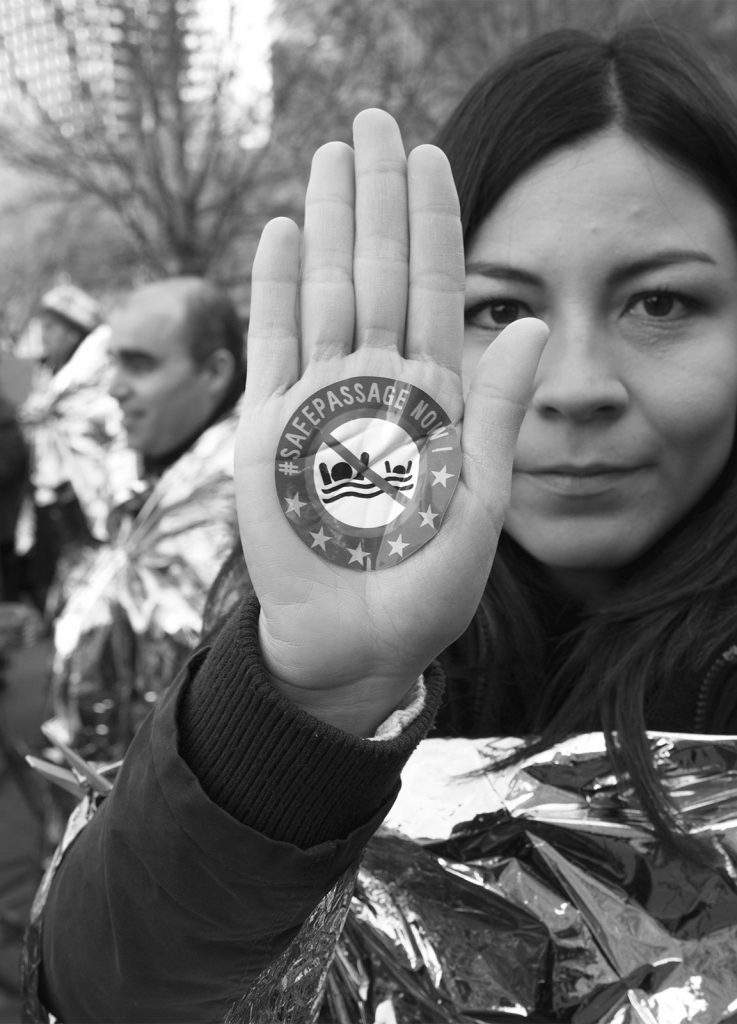While the European Union (EU) reaches agreements to return refugees to countries with such poor human rights records as Turkey or Afghanistan; while the vast majority of European countries show an embarrassing reluctance to resettle people in need of protection; while the discourse of xenophobic parties seems to be making significant inroads; in short, while many institutions are failing us as defenders of fundamental rights and freedoms, a segment of the population is taking action to advocate, above all, principles of solidarity. They work with few resources, little media attention and little chance to achieve a political impact; but forcefully, creatively, nonviolently and with the conviction that international human rights treaties are still fully in force – all of them.
This Peace in Progress monograph aims to give visibility to this solidarity activism, along with the peaceful social protests that strive to counter the discourse of fear and confront political decisions that establish unacceptable limits on legal and ethical safeguards with regard to human rights.
The first article, by journalist and ICIP board member Carme Colomina, gives us an overview of the situation. First of all, it shows how EU countries have not been able to reach agreement on how to deal with the arrival in Europe of people fleeing violence from a perspective based on human rights, a fundamental and founding cornerstone of the EU. Furthermore, it shows how Europe is also physically splitting up with the construction of new physical walls in what was supposed to be a common space. And, finally, it shows the rift between a considerable part of public opinion, much more favorable to the resettlement of refugees, and government policies.
While many institutions are failing us as defenders of fundamental rights and freedoms, a segment of the population is taking action to advocate principles of solidarity
In the second article, researcher Xavier Alcalde points out the importance of choosing our words carefully since each one carries its own weight and an inappropriate use of language can lead to a widespread misinterpretation of reality. More specifically, the author, like many other researchers and activists, reflects on whether “refugee crisis” is the most adequate term to use to refer to the situation at hand.
The following two articles aim to highlight some of the many acts of solidarity carried out in favor of the displaced population. Some of them have begun recently while others have been carried out for years because, unfortunately, migration and the search for asylum are nothing new.
Journalist Cristina Mas takes us to the refugee camps in Greece, which she has visited recently, to tell us about the “three rings of solidarity”: refugees themselves who help each other on the road to exile; the residents of towns where refugees arrive; and the volunteers and NGO workers who have mobilized to provide them with the support they need. She goes on to explain that grassroots actions, from these three rings, contrast “with the policies of governments that have done nothing but build walls and fences, militarize the streets, and fill the Mediterranean with warships.”
Solidarity activism and peaceful social protests strive to counter the discourse of fear and confront political decisions that establish unacceptable limits on legal and ethical safeguards with regard to human rights
Activists Lídia Ucher and Jara Henar offer a wide panorama of different types of networks and action campaigns across Europe in favor of migration policies based on the dignity and human rights inherent to all people. These networks and campaigns call for a humanitarian response that saves lives, safe and legal routes that prevent more deaths, the closure of immigration detention centers where so many abuses are being committed, effective protection of the right to asylum, adequate resettlement, etc. People have also organized around initiatives that are more focused on analyzing the causes of this crisis, breaking stereotypes about foreigners, publicizing the situation they are in, and proposing solutions.
Regarding this last point, our monograph on solidarity with refugees aims precisely to emphasize the importance of education, both in and out of school, in order to break stereotypes about displaced persons, create empathy, and avoid a drift towards xenophobia, which is already apparent in certain European countries. That is what Cécile Barbeito, researcher at the School of Peace Culture and ICIP board member, does in the fifth and last article.
Finally, in order to have the vision of a person who left his job and country to help with the rescue and assistance of people trying to reach Europe by sea routes, we interviewed Essam Daod, a Palestinian doctor and founder of the NGO Humanity Crew. He explains the enormous difficulties encountered by those working to assist refugees arriving in Greece, but also the enormous satisfaction of dedicating oneself to those most in need and contributing to changing the current situation.
Preparing the “Recommendations” section for this issue was particularly difficult precisely because of the great diversity and amount of valuable resources and the impossibility to include them all. We hope they will serve as a springboard leading to other initiatives, websites, publications, films and reflections that are equally necessary and interesting for our readers.
Photography (CC) : Han Soete. Protest in favor of “Safe passage” in Brussels, 27th February 2016
© Generalitat de Catalunya
